Behind the Firewall
This is a translation of a German post. View original or Never translate German
Yesterday — around 19:00
With two backpacks each exit the metro and arrive at the Louhu border crossing, leaving Hong Kong and entering the People's Republic of China for real.
The anticipated culture shock ends up being much smaller than expected — Shenzhen, with 22 million inhabitants by far the largest city on our journey, looks a lot like Hong Kong at a glance: The driving gets a bit rougher, the buildings a bit shorter, and the Europeans all but disappear from the streets, being replaced by bicycles we rarely saw in Hong Kong. Apart from that, and as predicted by our guidebook, we naturally notice immediately that our extensive knowledge of Cantonese ("Hello", "Thank you / sorry", "Please mind the gap between the train and the platform") isn't of much use anymore: The migrant city of Shenzhen speaks Mandarin.
After our baggage is X-rayed by largely disinterested security staff at the metro station, we arrive at the Panda Hostel on the 13th floor of some random building. In the entrance area, a group of Chinese guests has gathered around a board of Chinese chess, smoking while discussing moves.
The smoke alarm going off multiple times during that session doesn't seem to disturb anyone.
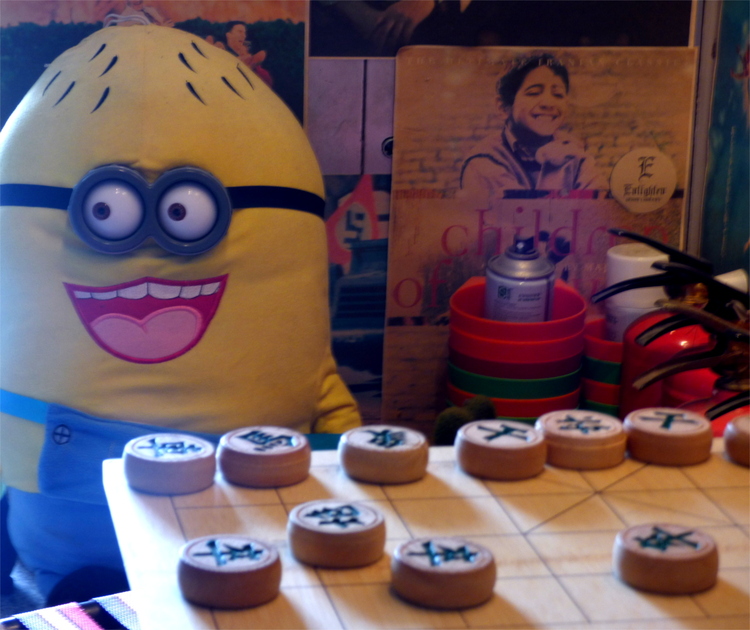
Sadly I don't know how to play: Chinese chess at the hostel
Our room is currently only inhabited by a Russian dance instructor from Saint Petersburg who wants to make a living teaching Latin American dance here. Luckily for us, he also speaks decent Chinese and he joins us for dinner in a Muslim-Chinese restaurant around the corner. In the supermarket next door he manages to convince us to try some suspicious looking Chinese "Milk Candy" — we don't understand the appeal of the faintly milky tasting tablets, though.
Back in the hostel we are confronted with the biggest hurdle on our journey so far — the Great Firewall, China's internet censorship. Everything related to Google (or DuckDuckGo, for that matter) ceases to work once you cross the border — that includes maps, mail, search, translation, YouTube, and many more. Many apps only load sporadically and connections to services from abroad are chronically slow. While I have managed to get uncensored internet on my laptop (shoutout to the Tor Project), our phones remain firmly in the grip of the Chinese censors for now.
The next morning we see Shenzhen in daylight for the first time — and the view from our hostel is quite nice to be honest, even if slightly smoggy.
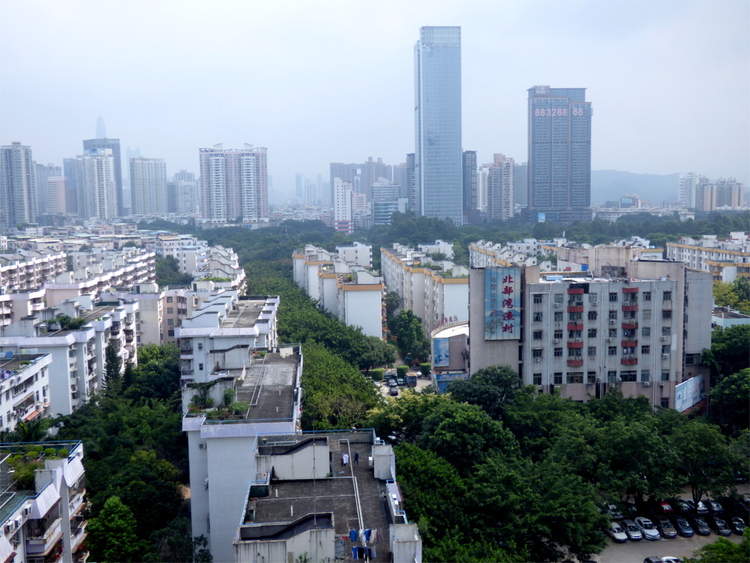
View from the 13th floor
As you might guess from the picture, Shenzhen is a pretty green city by Chinese standards — and, thanks to the booming electronics industry, also one of the most affluent cities in the country.
Shenzhen looks more modern than I would have expected. The city seems very young and there is still a lot of construction going on all over.
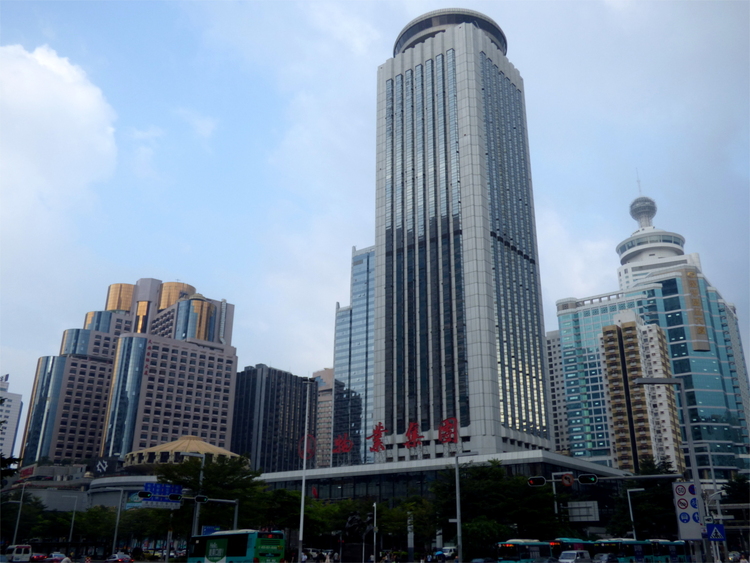
Downtown Shenzhen
And that already brings us to the first thing on our list today: Shenzhen is the epicentre of worldwide electronics manufacturing and trade — the odds that the device you are reading this on right now has been here before are more than just good. In huge market buildings here you can find everything just remotely related to electricity — I can't wait to check it out myself.
And as soon as we enter the first building of the Hua Qiang Bei district, we know that what we heard was not an exaggeration: On over ten floors there is everything from LEDs in all shapes and sizes and entire rolls of transistors and memory chips up to laptops, drones, and all sorts of strange gadgets.
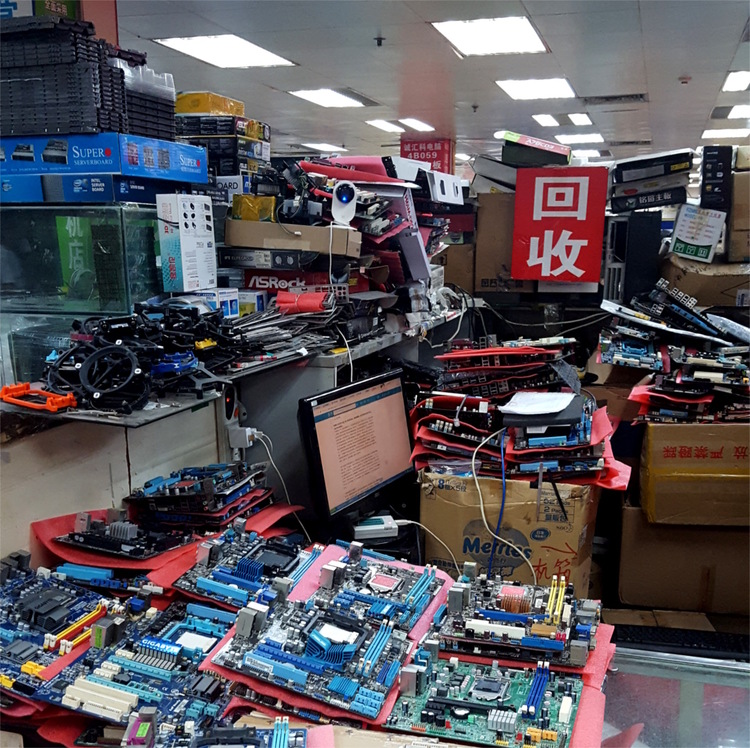
Mainboardbooth
Between the different merchant's booths, young children run around playing and those not busy bargaining, soldering, or otherwise tinkering around are watching movies on their laptops, drinking tea or eating takeout from Styrofoam containers.
We found some neat stuff at one or the other booth ourselves and are now proud owners of such high-quality products as a 3.50€ Bluetooth speaker and a 4€ MP3-Player.
Around the afternoon we are done shopping for the day and head to the botanical garden (more a huge park than a garden) to see some green for a change. In there, we find a pretty lake with small boats, a temple, a bamboo garden, and many more green things.
As I found out, the bananas laying around in the temple are not meant to be eaten but are religious sacrifices — and inquiring whether you could buy one might get you laughed at. Not that I would have tried that...
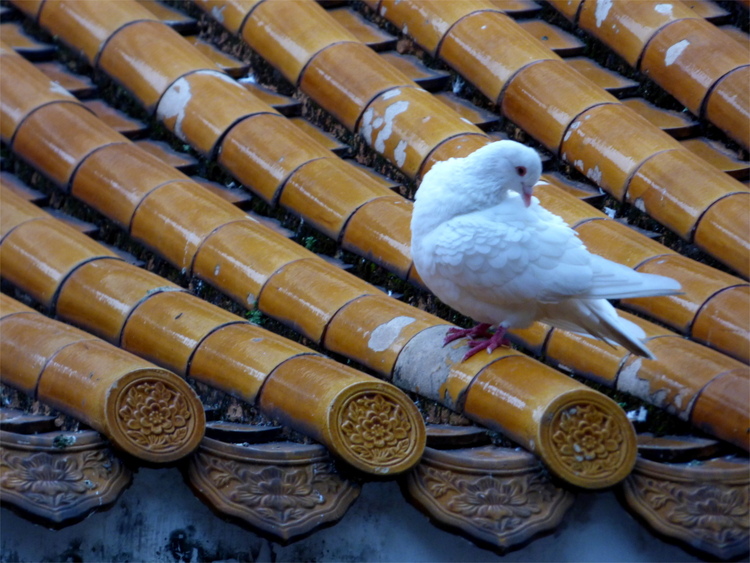
... better a pigeon on the roof
That we end up utterly lost in that same garden for one and a half hours between dusk and complete darkness, taking one or the other detour across unlit construction sites and only find our way out thanks to two Chinese women and Google Translate's offline capabilities is a story for another time...
Thanks to them we also learned that the correct way to the exit does indeed take you across the construction pit — mud in your shoes and everything. In the cab back home, we are unsure who should fear for their life: Us in the car or the people on scooters that our driver cuts across without batting an eye, almost knocking them off the street.
Well it wasn't quite that bad...